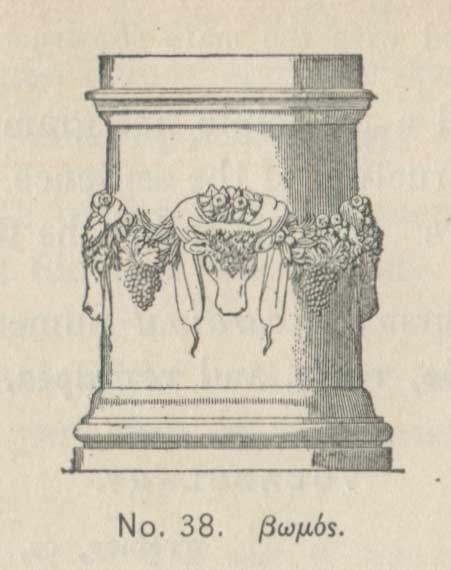THE FIRST GREEK BOOK
BY JOHN WILLIAMS WHITE, PH.D, LL.D., LITT.D.
Professor Of Ancient Greek At Harvard University
This Revision Copyright ©2012 by Shawn Irwin
Lesson LV - Stems in a Diphthong of the Consonant Declension
S506. Learn the declension of βασιλεύς, king, βοῦς,
ox, cow, γραῦς, old woman, and ναῦς, ship, in 749.
S507. Final υ of the stem disappears before all vowels in the endings, and in ναῦς
the resulting να becomes νε before a long vowel and νη
before a short vowel. The genitive singular may end in ως instead of ος.
S508. VOCABULARY.
ἀπέρχομαι, come or go away, retreat, desert.
Ἄρτεμις, ιδος, ἡ, Αrtemis.
βασιλεύς. έως, ὁ, (compare βασιλεύω), king.
βοῦς, βοός, ὁ, ἡ, ox, cow; plural, cattle, oxen.
βωμός, οῦ, ὁ, altar.
γραῦς, γρᾱός, ἡ, (compare γέρων), old woman.
γυνή, γυναικός, ἡ, woman, wife.
ἐπεὶδή, (πρεί + δή), conjunction, when, since.
ἑπμηνεύς, έως, ὁ, interpreter.
ἔπχομαι, (ἐρχ, ἐλύθ), ἦλθον, ἐλήλύθα, come, go.
ἱππεύς, έως, ὁ, (compare ἵππος), horseman, cavalryman; plural, cavalry.
ναῦς, νεώς, ἡ, ship.
οὐκοῦν, (οὐ + οὖν), interrogative particle, not then? not therefore? expecting an affirmative answer.
στρατοπεδεύομαι, στπατοπεδεύσομαι, etc. (compare στρατόπρεδον),
middle deponent, go into camp, encamp.
S509.
1. ταῖς ναυσὶν ἐπολιόρκει Μίλητον.
Dative of instrument (866).
2. ἐν δὲ ταῖς οἰκίαις ἦσαν βόες καὶ ὄρνιθες.
3. ἁ δὲ ἑρμηνεὺς λέγει ὅτι παρὰ βασιλέως μεγάλου ἔρχονται παρὰ Κῦρον.
When the reference is to the king of Persia, βασιλέυς commonly stands without the article.
4. παρῆν δὲ καὶ στρατηγὸς τις Λακεδαιμόνιος ἐπὶ τῶν νεῶν.
5. εἰ βασιλεὺς ἐν τῷ πεδίῳ στρατοπεδεύοιτο, οπλίσαιντοἀνοἱ ἱππεῖς.
6. ἦλθεν ἐπὶ τὸν τῆς Ἀρτέμιδος βωμὸν ὁ ἑρμηνεύς.
7. τούτου ἕνεκα Κῦρος τὰς ναῦς μετεπέμψατο.
8. τοὺς γέροντας καὶ τὰς γραῦς κατέλιπον˙ ὀλίγᾱς γὰρ ναῦς εἶχον.
9. καὶ παρὰ μεγάλου βασιλέως παρῆν Τισσαφέρνης καὶ ὁ τῆς βασιλέως γυναικὸς ἀδελφός,
10. οὐκοῦν παρὰ βασιλέως πολλοὶ πρὸς Κῦρον ἀπῆλθον, ἐπειδὴ πολέμιοι ἀλλήλοις ἐγένοντο;
S510.
1. He sent the interpreter to the generals of the Greeks,
παρὰ with the accusative.
2. Let us plunder the king's country.
3. They asked the king for cattle.
Verbs signifying to ask take two object accusatives (838).
4. The expedition will be against the great king.
ἐσσται, (for ἐσεται). For the future, see 170.
5. For Cyrus sent to the king the tributes from the cities.
S511. He cross-examines Orontas.
"Μετὰ ταῦτα," ἔφη, "ὦ Ὀρόντα, τί σε ηδίκησα;" αποκρίνεται ὅτι
οὐδὲν ἠδίκησε. πάλιν δὲ ὁ Κῦρος ἠρώτα, "Οὐκοῦν ὕστερον, ὡς
αὐτὸς σὺ ὁμολογεῖς, οὐδὲν ὑπ᾽ ἐμοῦ ἀδικούμενος κακῶς ἐποίεις
τὴν ἐμὴν χώρᾱν;" ἔφη ὁ Ὀρόντας. "Οὐκοῦν," ἔφη ὁ Κῦρος, "ὁπότ᾽
αὖ ἐγίγνωσκες τὴν σαυτοῦ δύναμιν, ἐλθὼν ἐπὶ τὸν τῆς ἀρτέμιδος
βωμὸν καὶ πείσας ἐμὲ πιστὰ πάλιν ἔδωκας μοι καὶ ἔλαβες παρ᾽ ἐμοῦ;"
καὶ ταῦθ᾽ ὡμολόγει ὁ Ὀρόντας.
Cognate accusative (833), what wrong did I do you?
οὐδέν: the answer of Orontas in his own words was ὀψδὲν ἠδίκησας you did me no
wrong, ὀηδέν is the neuter accusative singular of οὐδείς no, none.
Concessive participle (495, 6),
Said "Yes.".
Second aorist participle, declined like ἑκων.
Did you give.

See the route on the map.
End Of Chapter
INDEX
Chapter 56
HOME
This Revision Copyright ©2012 by Shawn Irwin
